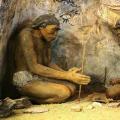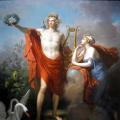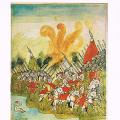The myth "Apollo and the Muses" is one of the most famous works of ancient Greece. It is almost impossible to name the author or even the approximate date of creation. The myth “Apollo and the Muses” is necessarily included in the school curriculum in many countries around the world. There are several versions of the original that differ slightly.
There are also several translations by different people who worked mainly during the USSR era.
"Apollo and the Muses"
The myth was created long before the advent of Christianity. Therefore, the original version underwent folklore changes. However, the researchers managed to almost completely recreate the original. This is due to the fact that the myth is written in the style of epic prose, which is easy to distinguish from “folk” folklore. The myth "Apollo and the Muses" describes the rise of the god to Olympus. The main gods sat on this mountain. There was always intrigue and hostility. Almost every god had his own enemy or envious person. Constant noise. And amid this bustle, Apollo appears, accompanied by 9 muses. He plays the cithara. The muses sing and dance around him. The gods immediately began to listen in fascination. Even the formidable Zeus did not utter a word. Eagle, Hera, Artemis - everyone looked at the arrivals. Their singing made us forget about troubles and just enjoy ourselves.

The main message of this myth is the search for harmony in art. 9 muses represented various sciences and arts. The legend tells the reader that even the best of the best can allow themselves to lose themselves in music. The supremacy of Apollo is the personification of the superiority of beauty. He seems to be a person who is inspired by creativity (for which the muses are responsible).
Apollo
The myth "Apollo and the Muses" assigns a significant role to Apollo. He is one of the most revered in Greek mythology. Many sculptural compositions are dedicated to him. Even after thousands of years, Apollo is still a household name that denotes the physical strength and beauty of a person.
Muses
Muses are patrons of the arts. Their images are also still used in many languages. For example, the well-known word “music” takes its roots precisely in ancient Greece, only then did it mean art in general. According to legend, the muses were born from Zeus himself. Each woman is responsible for a certain science or branch of art. The Muses come to mortals to inspire them. For this they build temples for the goddesses and write poems. Almost half of the muses are responsible for poetry. The myth "Apollo and the Muses" describes them dressed in snow-white robes and wreaths. In addition to singing, the goddesses also lead round dances, which are later joined by other inhabitants of Olympus.
In spring and summer, on the slopes of the wooded Helikon, where the sacred waters of the Hippocrene spring mysteriously murmur, and on high Parnassus, near the clear waters of the Castalian spring, Apollo dances with nine muses. Young, beautiful muses, daughters of Zeus and Mnemosyne, are Apollo's constant companions. He leads the choir of muses and accompanies their singing by playing his golden lyre.
Apollo walks majestically ahead of the choir of muses, crowned with a laurel wreath, followed by all nine muses: Calliope - the muse of epic poetry, Euterpe - the muse of lyric poetry, Erato - the muse of love songs, Melpomene - the muse of tragedy, Thalia - the muse of comedy, Terpsichore - the muse of dancing, Clio is the muse of history, Urania is the muse of astronomy and Polyhymnia is the muse of sacred hymns. Their choir thunders solemnly, and all nature, as if enchanted, listens to their divine singing.
When Apollo, accompanied by the muses, appears in the host of gods on bright Olympus and the sounds of his cithara and the singing of the muses are heard, then everything on Olympus falls silent. Ares forgets about the noise of bloody battles, lightning does not sparkle in the hands of the cloud suppressor Zeus, the gods forget strife, peace and silence reign on Olympus. Even the eagle of Zeus lowers its mighty wings and closes its watchful eyes, its menacing screech is not heard, it quietly dozes on the rod of Zeus. The strings of Apollo's cithara sound solemnly in complete silence. When Apollo cheerfully strikes the golden strings of the cithara, then a bright, shining round dance moves in the banquet hall of the gods. Muses, Charites, the eternally young Aphrodite, Ares and Hermes - everyone takes part in a cheerful round dance, and in front of everyone is the majestic maiden, Apollo’s sister, the beautiful Artemis. Flooded with streams of golden light, the young gods dance to the sounds of Apollo's cithara.
Terpsichore is a dancing muse who plays the lyre.  Thalia - the muse of comedy, with a tympanum in her hands;
Thalia - the muse of comedy, with a tympanum in her hands;
A comic mask lies near her feet.  Urania - the muse of astronomy, with a manuscript scroll in her hands.
Urania - the muse of astronomy, with a manuscript scroll in her hands.
The work of almost every great artist is unthinkable without the presence of a woman who inspires him - the muse.
Raphael's immortal works were painted using images that his lover, the model Fornarina, helped create; Michelangelo enjoyed a platonic relationship with the famous Italian poetess Vittoria Colonna.
The beauty of Simonetta Vespucci was immortalized by Sandro Botticelli, and the famous Gala inspired the great Salvador Dali.
Who are the muses?
The ancient Greeks believed that every area of their life that they considered most important had its own patron, a muse.
According to their ideas, The list of muses of ancient Greece looked like this:
- Calliope is the muse of epic poetry;
- Clio is the muse of history;
- Melpomene - the muse of tragedy;
- Thalia is the muse of comedy;
- Polyhymnia - the muse of sacred hymns;
- Terpsichore – muse of dance;
- Euterpe is the muse of poetry and lyricism;
- Erato is the muse of love and wedding poetry;
- Urania is the muse of science.
According to classical Greek mythology, nine daughters were born to the supreme god Zeus and Mnemosyne, daughter of the titans Uranus and Gaia. Since Mnemosyne was the goddess of memory, it is not surprising that her daughters began to be called muses, translated from Greek this means “thinking”.
It was assumed that the favorite habitat of the muses was Mount Parnassus and Helicon, where in the shady groves, to the sound of clear springs, they formed Apollo's retinue.
They sang and danced to the sound of his lyre. This subject was loved by many Renaissance artists. Raphael used it in his famous paintings of the Vatican halls.
Andrea Montegna's work "Parnassus", which depicts Apollo surrounded by muses dancing for the supreme gods of Olympus, can be seen in the Louvre.
The famous sarcophagus of the Muses is also located there. It was found in the 18th century in Roman excavations, its lower bas-relief is decorated with an excellent image of all 9 muses.
Museyons
In honor of the muses, special temples were built - museions, which were the focus of the cultural and artistic life of Hellas.The most famous is the Alexandria Museum. This name formed the basis of the well-known word museum.
Alexander the Great founded Alexandria as a center of Hellenistic culture in the Egypt he conquered. After his death, his body was brought here to a tomb specially built for him.. But, unfortunately, then the remains of the great king disappeared and have not yet been found.
One of the associates of Alexander the Great, Ptolemy I Soter, who laid the foundation for the Ptolemaic dynasty, founded a museum in Alexandria, which combined a research center, an observatory, a botanical garden, a menagerie, a museum, famous library.
Archimedes, Euclid, Eratosthenes, Herophilus, Plotinus and other great minds of Hellas worked under its arches.
The most favorable conditions were created for successful work, scientists could meet each other, have long conversations, as a result, the greatest discoveries were made, which have not lost their significance even now.
The muses were always depicted as young, beautiful women; they had the ability to see the past and predict the future.
The greatest favor of these beautiful creatures was enjoyed by singers, poets, artists, muses encouraged them in creativity and served as a source of inspiration.
Unique abilities of muses
Clio, the "Glory-Giving" Muse of History, whose permanent attribute is a parchment scroll or board with writing, where she wrote down all events in order to preserve them in the memory of descendants.
As the ancient Greek historian Diodorus said about her: “The greatest of muses inspires love for the past.”
According to mythology, Clio was friends with Calliope. The surviving sculptural and pictorial images of these muses are very similar, often made by the same master.
There is a myth about a quarrel that arose between Aphrodite and Clio.
Possessing strict morals, the goddess of history did not know love and condemned Aphrodite, who was the wife of the god Hephaestus, for her tender feelings for the young god Dionysus.
Aphrodite ordered her son Eros to shoot two arrows, the one that kindled love hit Clio, and the one that killed her went to Pieron.
Suffering from unrequited love convinced the strict muse not to judge anyone anymore for their feelings.
Melpomene, muse of tragedy
Her two daughters had magical voices and decided to challenge the muses, but lost and to punish them for their pride.
Zeus or Poseidon, here the opinions of myth-makers differ, turned them into sirens.
The same ones that almost killed the Argonauts.
Melpomene vowed to forever regret their fate and all those who defy the will of heaven.
She is always wrapped in a theatrical robe, and her symbol is a mournful mask, which she holds in her right hand.
In her left hand is a sword, symbolizing punishment for insolence.
Thalia, muse of comedy, sister of Melpomene, but never accepted her sister’s unconditional belief that punishment was inevitable, this often became the reason for their quarrels.
She is always depicted with a comedy mask in her hands, her head is decorated with an ivy wreath, and she is distinguished by her cheerful disposition and optimism.
Both sisters symbolize life experience and reflect the way of thinking characteristic of the inhabitants of ancient Greece that the whole world is a theater of the gods, and people in it only perform their assigned roles.
Polyhymnia, muse of sacred hymns, faith expressed in music
The patroness of speakers, the fervor of their speeches and the interest of listeners depended on her favor.
On the eve of the performance, one should ask the muse for help, then she would condescend to the person asking and instill in him the gift of eloquence, the ability to penetrate every soul.
The constant attribute of Polyhymnia is the lyre.
Euterpe – muse of poetry and lyricism
She stood out among other muses for her special, sensual perception of poetry.
To the quiet accompaniment of Orpheus' harp, her poems delighted the ears of the gods on the Olympian hill.
Considered the most beautiful and feminine of the muses, she became the savior of his soul for him, who had lost Eurydice.
Euterpe's attribute is a double flute and a wreath of fresh flowers.
As a rule, she was depicted surrounded by forest nymphs.
Terpsichore, muse of dance, which is performed in the same rhythm with heartbeats.
The perfect art of Terpsichore dance expressed complete harmony of the natural principle, movements of the human body and spiritual emotions.
The muse was depicted in a simple tunic, with an ivy wreath on her head and with a lyre in her hands.
Erato, muse of love and wedding poetry
Her song is that there is no force that can separate loving hearts.
Songwriters called on the muse to inspire them to create new beautiful works.
Erato's attribute is a lyre or tambourine; her head is decorated with wonderful roses as a symbol of eternal love.
Calliope, which means “beautiful-voiced” in Greek, is the muse of epic poetry.
The eldest of the children of Zeus and Mnemosyne and, in addition, the mother of Orpheus, from her the son inherited a subtle understanding of music.
She was always depicted in the pose of a beautiful dreamer, holding in her hands a wax tablet and a wooden stick - a stylus, which is why the well-known expression “writing in a high style” appeared.
The ancient poet Dionysius Medny called poetry “the cry of Calliope.”
The ninth muse of astronomy, the wisest of the daughters of Zeus, Urania holds in her hands the symbol of the celestial sphere - a globe and a compass, which helps determine the distances between celestial bodies.
The name was given to the muse in honor of the god of heaven, Uranus, who existed even before Zeus.
Interestingly, Urania, the goddess of science, is among the muses associated with various types of arts. Why?
According to the teaching of Pythagoras on the “harmony of the celestial spheres,” the dimensional relationships of musical sounds are comparable to the distances between the celestial bodies. Without knowing one, it is impossible to achieve harmony in the other.
As the goddess of science, Urania is still revered today. There is even a Urania Museum in Russia.
The muses symbolized the hidden virtues of human nature and contributed to their manifestation.
According to the ideas of the ancient Greeks, the muses had the amazing gift of introducing the souls of people to the great secrets of the Universe, memories of which they then embodied in poetry, music, and scientific discoveries.
Patronizing all creative people, the muses did not tolerate vanity and deception and severely punished them.
The Macedonian king Pierus had 9 daughters with beautiful voices, who decided to challenge the muses to a competition.
Calliope won and was declared the winner, but the Pierids refused to admit defeat and tried to start a fight. For this they were punished, and they were turned into forty.
Instead of wonderful singing, they announce their fate to the whole world with sharp guttural screams.
Therefore, you can count on the help of the muses and divine providence only if your thoughts are pure and your aspirations are selfless.
Read an interesting article about Hera, Aphrodite and Athena.
Apollo and his muses.
Ancient Greek mythology tells that in spring and summer on the slopes of the wooded Helikon, where the sacred waters of the Hippocrene spring mysteriously murmur, and on high Parnassus, near the clear waters of the Kastal spring, Apollo dances with nine muses. Young, beautiful muses, daughters of Zeus and Mnemosyne, are Apollo's constant companions. He leads the choir of muses and accompanies their singing by playing his golden lyre. Apollo walks majestically ahead of the choir of muses, crowned with a laurel wreath, followed by all nine muses: Calliope - the muse of epic poetry, Euterpe - the muse of lyric poetry, Erato - the muse of love songs, Melpomene - the muse of tragedy, Thalia - the muse of comedy, Terpsichore - the muse of dancing, Clio is the muse of history, Urania is the muse of astronomy and Polyhymnia is the muse of sacred hymns. Their choir thunders solemnly, and all nature, as if enchanted, listens to their divine singing.
When Apollo, accompanied by the muses, appears in the host of gods on bright Olympus and the sounds of his cithara and the singing of the muses are heard, then everything on Olympus falls silent. Ares forgets about the noise of bloody battles, lightning does not sparkle in the hands of the thunderer Zeus, the gods forget strife, peace and silence reign on Olympus. Even the eagle of Zeus lowers its mighty wings and closes its watchful eyes, its menacing screech is not heard, it quietly dozes on the rod of Zeus. The strings of Apollo's cithara sound solemnly in complete silence. When Apollo cheerfully strikes the golden strings of the cithara, then a bright, shining round dance moves in the banquet hall of the gods. Muses, Charites, the eternally young Aphrodite, Ares and Hermes - everyone takes part in a merry round dance, and in front of everyone is the majestic maiden, Apollo’s sister, the beautiful Artemis. Flooded with streams of golden light, the young gods dance to the sounds of Apollo's cithara.
Muses:
Calliope"beautiful voice" · the muse of epic poetry and science, she stands out among all other muses. She was depicted as a girl with a wax tablet and an otyl - a sharpened slate stick for writing letters - in her hands. “Calliope keeps the songs of heroic times in the book,” wrote the ancient Roman poet Ausonius.
The sons of Calliope and Eager (or Apollo) were the famous singers Lynx and Orpheus. According to some sources, the Thracian hero Res, who was killed near Troy by Diomedes, is also considered her son.
Clio, Klia · one of the nine Olympic muses, the muse of history, the one “who glorifies.” In the imagination of the ancients, a girl with a papyrus scroll and a slate stick in her hands: obviously, the scroll contained a chronicle of bygone times. It is known about Clio that she fell in love with Pierre, the son of Magnet, and gave birth to a son, Hyacinth.
Melpomene · muse of tragedy (Greek: “singing”). At first, Melpomene was considered the muse of song, then of sad song, and later she became the patroness of theater in general, the personification of tragic stage art. Melpomene was depicted as a woman with a bandage on her head and a wreath of grape or ivy leaves, in a theatrical robe, with a tragic mask in one hand and a sword or club in the other (a symbol of the inevitability of punishment for a person who violates the will of the gods). From the river god Aheloy gave birth to sweet-voiced sirens, famous for their singing.
Polyhymnia, Polymnia · first the muse of dance, then of pantomime, hymns, serious gymnasium poetry, which is credited with the invention of the lyre. Polyhymnia helped to “remember what was captured.” The name Polyhymnia indicates that the poets acquired immortal fame for the hymns they created. She was depicted as a girl wrapped in a blanket in a thoughtful pose, with a dreamy face and with a scroll in her hand.
Talia, Falia · one of the nine daughters of Zeus and Mnemosyne, patroness of comedy and light poetry. She was depicted with a comic mask in her hands and an ivy wreath on her head. The Corybantes were born from Thalia and Apollo. Zeus, turning into a kite, took Thalia as his wife. Out of fear of Hera's jealousy, the muse hid in the depths of the potion, where demonic creatures were born from her - paliki (in this myth she is called the nymph of Etna).
Terpsichore · was considered the muse of choral singing and dance, and was depicted as a young woman in the pose of a dancer, with a smile on her face. She had a wreath on her head, in one hand she held a lyre, and in the other a plectrum. She is “enjoying round dances.”
According to one version of the myth, Terpsichore gave birth to sirens from the river god Aheloy. There is a myth according to which she is the mother of the singer Lin (according to another version, his mother is Urania). This muse is associated with Dionysus, attributing to her an attribute of this god - ivy (as stated in the inscription on Helicon dedicated to Terpsichore).
Urania · the muse of astronomy, a girl with a globe and a compass (or pointing stick) in her hands, in other versions of the myth was considered the embodiment of sublime, heavenly love. According to some versions, the mother of the singer Lina, whom she gave birth to from Apollo.
Euterpe · the patron muse of lyric poetry, usually depicted with a double flute in her hand. Res, the hero who died at the hands of Diomedes under the walls of Troy, was considered her son from the god of the river Stremon.
Erato · one of the muses, she was given the role of patroness of lyric and love poetry. She was depicted with a cithara in her hand.
In spring and summer on the slopes of the wooded Helikon, where the sacred waters mysteriously murmur
the source of Hippocrene, and on high Parnassus, near the clear waters of the Kastali spring, Apollo dances with nine muses. Young, beautiful muses, daughters of Zeus and Mnemosyne, are Apollo's constant companions. He leads the choir of muses and accompanies their singing by playing his golden lyre. Apollo walks majestically ahead of the choir of muses, crowned with a laurel wreath, followed by all nine muses: Calliope - the muse of epic poetry, Euterpe - the muse of lyric poetry, Erato - the muse of love songs, Melpomene - the muse of tragedy, Thalia - the muse of comedy, Terpsichore - the muse of dancing, Clio is the muse of history, Urania is the muse of astronomy and Polyhymnia is the muse of sacred hymns. Their choir thunders solemnly, and all nature, as if enchanted, listens to their divine singing...
Thanks to Good Bye for the idea.
Apollo is at sea today
Warms your bones on the beach
And that means my home is waiting for you
The choir of beautiful muses is here to visit!
A series of beautiful singing,
The voice is a wonderful chime,
Words flow in waves,
Let Apollo rest.
I'll set the table for ten people.
Wine, hot, cold cuts...
And there is only one place for me,
And nine for the lovely guests.
Melpomene, Calliope,
Thalia and Terpsichore,
Clio, Polyhymnia,
Euterpe and Urania,
And of course playful
Familiar and dear to everyone,
Erato girl.
Why is everything in place? Begin
Our modest and discreet feast.
The candle fire flickers slightly,
We talk about whatever we want.
You are sad and quiet, Melpomene,
You can talk about a lot.
About troubles, grief and betrayal,
But this is not the time to be discouraged.
Oh yes, tragedy is your strong point,
But this evening is so wonderful!
Let's wipe away a tear with you,
Let's drive away all misfortunes with laughter!
Shall we dance, Terpsichore?
A childhood dream will come true.
Resist yourself from reproach,
I'm not much of a dancer. Honestly.
You dance like a goddess!
At least they laid flowers on the floor.
There is no pride in your article,
Because the dance is you.
The beauty of the syllable
With a harmless laugh
There will be a calliope
Compare with Euterpe.
Lots of stories
Clio and Urania
They will tell me simply.
Holding breath,
I will listen to speeches
About dreams and stars,
About the great battles
And forgotten wars.
I smoked on the balcony
Erato approached.
Told with love
Who rules in this world.
Polyhymnia will praise
Everyone in the world. And the gods
And all self-praising kings,
Both the rich and the thieves.
But please don't torture your lungs.
I invited you to visit,
But your speeches are loud
I'm a little tired.
And thanks to Thalia
For a cheerful laugh.
We melted from him
The voice is soft fur!
Jokes and stories
The evening was full.
It's a pity that it's early in the morning
I forgot them.
Next day in the evening
I'll probably wake up sooner.
The collapse in the apartment
Covered notebooks.
The muses owned me,
Wrote non-stop
Poems, poems, prose,
Then the eyes closed.




